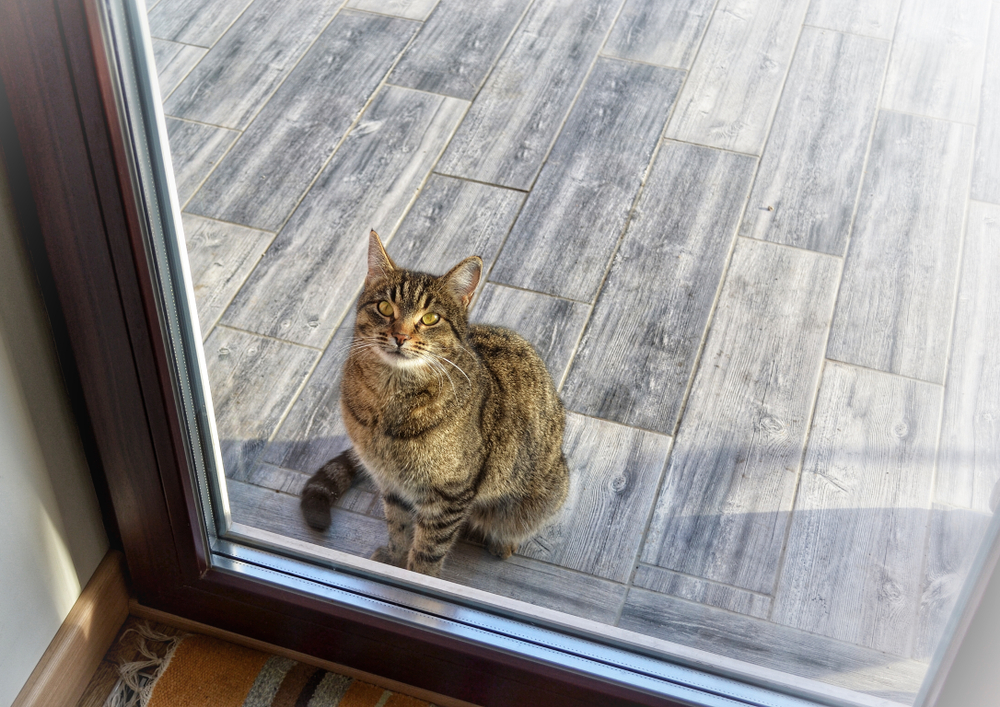📖 Table of Content:
Cats are curious creatures and they’re almost always going to sniff around the one room you don’t want them to. What are you supposed to do when you’re trying to figure out how to keep a cat out of a room? What’s a tried-and-true trick you can use when you’re out of options?
Whether you’re adamant about making sure that the kitchen remains a cat-free space or concerned about your cat roaming around the basement beaming with dangerous chemicals, we’ve got you covered. We’re aware that cats aren’t familiar with the concept of “personal space,” but they’re very capable and clever.
Cats aren’t strangers to following you around from one room to the other, peeping through the bathroom door when you’re trying to take a shower, or even staring at you from the top of your chest when you’re trying to sleep. Contrary to popular belief, cats don’t care.
We’re kidding, we’re kidding. Cats care, but they’re a little slow when they’re expected to do something you want them to do. “Curiosity killed the cat,” but we’re bringing you a few of our favorite tips and tricks to ensure your four-legged friend survives snooping around the forbidden room.
More on that down below!
Why do cats always want what they can’t have?
Where do we even start? Cats are attracted to people who hate cats. Cats are obsessed with clawing at the furniture after you break the bank on a brand-new cat tree with a scratching post. Cats are drawn to whosits and whatsits you specifically keep out of reach. Why’s that, though?
Scientifically speaking, playing hard-to-get works on cats because they’re annoyed when they’re constantly bombarded with attention. Cats are self-sufficient, and they’re happier when they’re the ones approaching you rather than the other way around.
So, cats turn to humans that hate them because they’re attracted to the thought of getting to choose what they’re comfortable with. Similarly, when you try to avert your cat’s attention from specific food you don’t want her to eat or a room you don’t want her to enter, she wants to make that decision on her own.
We’re pretty sure you don’t want to waste your time trying to get your cat to obey you by punishing her, yelling at her, or – God forbid – disciplining her the same way you’d discipline a child. Cats don’t work that way and that’s okay. We’re more than happy to share our ways of how to keep a cat out of a room.
How to keep a cat out of a room?
1. Shut the door
When you’re trying to figure out how to keep a cat out of a room, you might overlook the simplest of answers because you’re focused on finding the miracle solution. Shutting the door of the room you don’t want your cat to enter can do the trick for the time being.
Sure, that might not work for cats that can’t take no for an answer, but there’s no reason why you wouldn’t be able to keep your cat out of the kitchen when you’re preparing dinner or out of the bathroom when you’re taking a shower.
But, but, but – keeping your cat out of the basement because that’s where you keep the dangerous chemicals might require a more creative approach. Cats tend to storm toward the room the moment you open the door anyway.
2. Avert your cat’s attention
Now, you can always try to avert your cat’s attention away from the forbidden room. When you catch your cat obsessing over the basement or the bedroom, you can try playing with her as a way to distract her. Cats are smart, but that doesn’t mean that you can’t outsmart your own feline.
With a few of her favorite toys, a cat tree, and a window perch, you can make your living room or your cat’s room more appealing to your pet than a forbidden room where her human doesn’t allow her to enter. Cats are curious, we know that, but they’re especially curious about things they’re not allowed to do.
3. Provide your cat with an alternative
More often than not, cats are attracted to rooms that contain something they’re interested in.
On one hand, your cat might be drawn to your bedroom because that’s where she spends most of her time birdwatching. She’s not to blame that your bedroom comes with the best view of your backyard, right?
On the other hand, she might be obsessed with the kitchen because that’s where you feed her every morning or afternoon. She knows that’s where you keep the food and that’s why she wants to be there when you change your mind and decide to throw her a treat or two.
Provide her with an alternative room or a nook she can call her own and she should stop bugging you in no time.
4. Pay no attention to your cat’s meowing, scratching, and tantrum-throwing
We know what you’re thinking – shutting the door, averting your cat’s attention, or even getting her a different room won’t change the fact that she never stops meowing, scratching, and waiting for you to open the door.
We’re aware that these things are easier said than done, but you need to ignore your cat’s bad behavior as best as you can. When you show your cat that she can meow or scratch the door to get your attention and get a reaction from you, she’s going to keep on doing that no matter what.
What’s even worse – she’s probably going to think you’re playing with her and make her meowing and scratching even worse. Pay no attention to her and she’s going to get bored and leave away from the door.
5. Use secondary barriers, baby gates, or pet-proof locks
“How to keep a cat out of a room that doesn’t have a door,” you wonder. With great advice comes great responsibility, and we do need to mention that there are times when you can’t shut the door or forbid your cat from entering a room by averting her attention.
But that doesn’t mean that your cat can do whatever she wants. Before you freak out over the fact that your cat doesn’t care about what you want, you can always resort to secondary barriers, baby gates, or pet-proof locks.
With these gorgeous gadgets, you won’t have to worry about your cat hopping over the fort you built to keep her away from the basement or the door to the backyard.
6. Use a scent, taste, or sound deterrent
We’ve got more where that came from! Apparently, you’re not the only one struggling to discipline your cat and there’s a myriad of products advertised for pet parents that need a little bit of help.
When you don’t want your four-legged friend to hate you because you prevent her from entering your bedroom or bathroom, you might want to resort to scent, taste, or sound deterrents.
First off, there’s no way she can ever figure out that you’re the one to blame. Furthermore, these are the things you probably already have lying around. Citrus, mint, and cinnamon are great scent deterrents because these are the scents cats hate the most.
Smearing a slight amount of hot sauce on the door might do the trick, too, because cats can’t stand the taste or scent of hot sauce.
Sudden sounds and alarms that go off when your cat approaches or touches the door are a foolproof way for your cat to associate scary sounds with the room you’re trying to keep her out of.
7. Make the room unappealing
With a room that doesn’t have a door, you can resort to the same techniques to make the room unappealing to your cat. Scatter a few mint, thyme, and rosemary flower pots around the room to ensure the entire space smells like an Italian kitchen.
Smear some hot sauce on surfaces your fluffy friend likes to lick. Place some sticky tape or double-sided tape on the floor to ensure her paws stick whenever she tries to explore the room.
Put aluminum foil right outside the entryway to make sure she needs to step over the shiny, sticky, noisy matter when she tries to enter the room. And there you go, she’s probably going to get nightmares about that room within the first week.
8. Reward good behavior
Whether you’re a pet parent to a strong-willed Bengal or a mellow Maine Coon, there’s no reason why you wouldn’t be able to keep your cat out of a room by training her.
With plenty of positive reinforcement, there’s no reason why you wouldn’t be able to train your cat to stop entering a room you don’t want her to enter. Whenever she stops at the door and doesn’t meow, scratch, or throw a tantrum, reward her with a treat.
When you avert her attention to something much more fun than the room she wants to enter, praise her by petting her or playing a game with her. Whatever you do, make sure you’re consistent with your efforts. Good luck!





